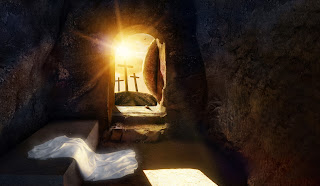1 Corinthians 15:1-5 (The Gospel in Summary)
1Moreover, brethren, I declare unto you the gospel which I preached unto you, which also ye have received, and wherein ye stand; 2By which also ye are saved, if ye keep in memory what I preached unto you, unless ye have believed in vain. 3For I delivered unto you first of all that which I also received, how that Christ died for our sins according to the scriptures; 4And that he was buried, and that he rose again the third day according to the scriptures: 5And that he was seen of Cephas, then of the twelve:
The Easter or Resurrection season is more than cute bunnies who lay chocolate eggs or a long weekend. It is a celebration of the Gospel of Jesus Christ and stems from the most important events in human history. In summary, the Gospel can be summarised in four main points:
- Death: Christ died for our sins according to the Scriptures
- Burial: He was buried;
- Resurrection: He rose again on the third day according to the Scriptures;
- Witnessed: Acts 1:3: To whom also he shewed himself alive after his passion by many infallible proofs, being seen of them forty days, and speaking of the things pertaining to the kingdom of God. Two or three credible witnesses are sufficient to establish a testimony (Deuteronomy 17:6; Matthew 18:16; 2 Corinthians 13:1). In the case of Christ and His resurrection, He was seen by Peter, the Twelve, five hundred, James, all apostles, and finally Paul (1 Corinthians 15:5-8). Case closed!
Anyone who believes and receives the Gospel has eternal salvation. That’s what Good Friday and Easter Sunday (Resurrection Day) are all about.
Why Did Jesus Go to the Cross?
Without the cross, there would be no resurrection and crown. Jesus was the Passover lamb who took away the sin of the world (John 1:29) and caused the ‘death angel’ to pass over everyone who had been cleansed by his blood (1 John 1:7). He endured fiery hatred to manifest God’s everlasting love; estranged from His own nation (John 1:11) so that He might bring reconciliation to the world (Ephesians 2:16). The cross was a curse to those who hung on it (Deuteronomy 21:23) but it released blessing on all who believe (Galatians 3:13-14).
Christ endured the most painful, humiliating and horrible death so that we might live an abundant life (John 10:10). The notion of a cursed and crucified Saviour was a stumbling block to the Jews and foolishness to the Greeks. Yet faith in the gospel turns these impediments into the wisdom and power of God (1 Corinthians 1:23-24). God uses the ‘foolishness’ of preaching Christ crucified to destroy worldly wisdom, overthrow temporal realism, and reveal His own irrefutable celestial wisdom.
Weakness, always shunned and rejected, becomes magnified in death. Indeed, there is nothing weaker than death itself. The weakest living man is mightier than the strongest dead man. The message of the cross is that God uses the weakness and death it brings to reveal God’s power: the power of the resurrection, the power of the Holy Spirit, and the power of changed lives.
Cross-induced power destroys every known foe, no matter how formidable and universal they once were. The cross crucifies and destroys sin, sickness, worldliness, danger, the devil, death and hell. Nothing else can do this. Jesus Christ is a great Saviour who gives us a great salvation.
The Scripture Must Be Fulfilled
Christ took a high view of Scripture — every word of it (Matthew 4:4; Proverbs 30:5). The scripture must be fulfilled & cannot be broken. Here is a sample of Old Testament prophecies which were fulfilled by Christ’s death, burial, and resurrection – the Gospel in cameo:
- Betrayed by a close friend Ps 41:9/Lu 22:47
- Betrayed for 30 pieces of silver Zech 11:12/Matt 26:14-15
- Accused by false witnesses Ps 35:11/Mark 14:57,58
- Silent to accusations Is 53:7/Mk 15:4-5
- Spat on and struck Is 50:6/Matt 26:67
- Hated without reason Ps 35:19/Jn 15:24
- Vicarious sacrifice Is 53:5/Rom 5:6,8
- Crucified with malefactors Is 53:12/Mk 15:27
- Pierced through His hands & feet Zech 12:10/John 20:27
- Sneered & mocked Ps 22:7,8/Lu 23:35
- Reproached Ps 69:9/Rom 15:3
- He prayed for His enemies Ps 109:4/Luke 23:34
- Soldiers gambled for His clothing Ps 22:17/Mt 27:35,36
- Forsaken by God Ps 22:1/Matt 27:46
- His bones were not broken Ps 34:20/John 19:32,33,36
- His side pierced Zech 12:10/John 19:34
- Buried with the rich Is 53:9/Matt 27:57-60
- To be resurrected Ps 16:10/Ps 49:15/Mark 16:6
What’s At Stake? If the resurrection of Christ was ‘fake news,’ we would be in serious trouble. There would be no atoning death, no new birth, no forgiveness of sins, no Christian faith and no future resurrection from the dead.
Paul writes in 1 Corinthians 15:13-18 a real catalogue of woes.
If there is no resurrection from the dead, then Christ did not rise either. There is no such thing as a one-time, one-person resurrection. If Christ did not rise, then our preaching is useless and so is your faith. Furthermore, we would be violating the ninth commandment by bearing false witness of God: that He raised up Christ from the dead. Again, no resurrection of Christ, your faith is in vain and you are still in your sins. Frightfully, those who committed their souls to a crucified, dead, buried, and un-resurrected Messiah are eternally lost. Paul concludes this catalogue of woes by stating if only in this life do we have hope in Christ, we are the most pitiful people on the planet.
Despite all these dreadful ‘what if’s,’ they are the ultimate ‘fake news.’ We have nothing to fear. In 1 Corinthians 15:20 Paul triumphantly announces that Christ is indeed risen from the dead and become the first fruits of those who sleep (a metaphor for death). When you see the first fruits on the crop, you know the rest of the harvest is coming. Christ is the first fruit of the dead, then those who belong to Him when He comes back to earth. On earth He will go about destroying all enemies: dominion, authority, and power (1 Corinthians 15:24). The final enemy assigned for destruction is death. Once accomplished, Jesus will hand over the kingdom to God the Father (v. 24).
The splendour and glory of the coming kingdom are so indescribably wonderful that we will vaguely remember the troubles we had in this fallen world. Yet it was all made possible by crucifixion, burial, and an empty tomb – He is not here for He is risen (Luke 24:6).
That is why the resurrection matters: yesterday, today, and forever.











